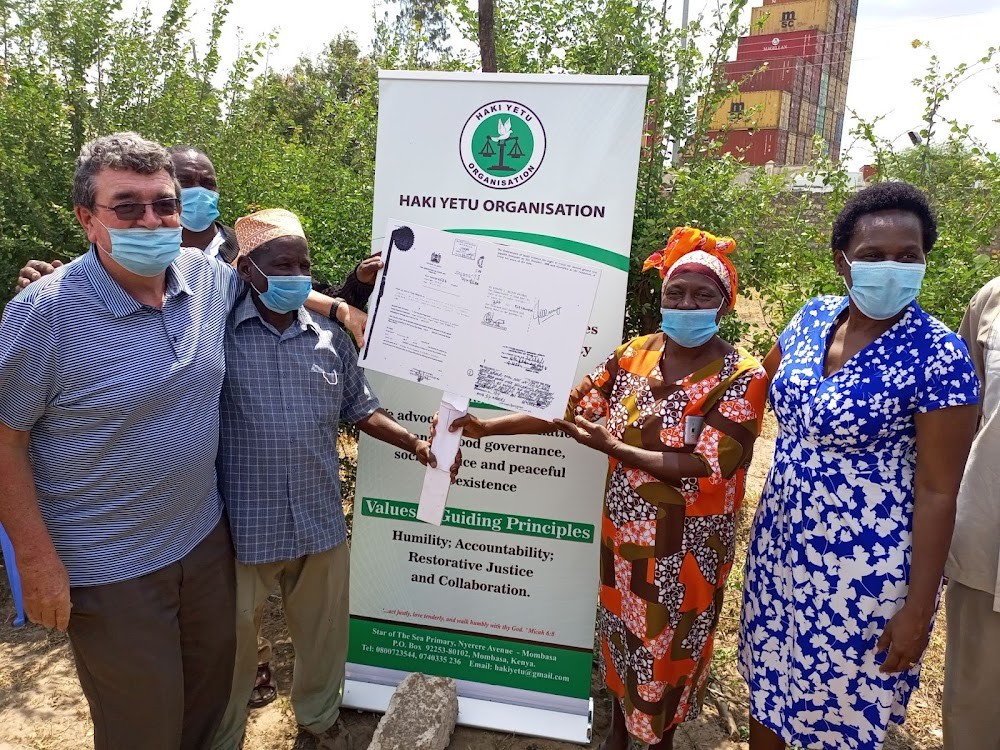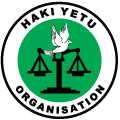Not many organisations can claim that they began operations without an address or a functioning office. Haki Yetu operated out of a metal box for nine months in 2008 and the shade from one of the few surviving trees in the area provided a meeting space for their first clients. When the blue box was unlocked, the office was open.
Visitors, who were not residents of Bangladesh - Mombasa’s largest informal settlement - frequently got lost as they waded through narrow pathways and open sewerage to find hope and a listening ear within meters of the noisy nursery school that doubled up as a house of worship on weekends.
The multi-purpose room was constructed with mud and when the seasonable rains raged, the area remained under water for days.
John Obonyo and Caroline Ikanda were the first volunteers and soon they were inundated with labour and rent cases, domestic violence and neglect. Yet, those early days of stumbling to provide service, hope and justice to the poorest of citizens grounded the organisation in values and attitudes that remain at the core of our vision and up until today.
There was no glamour attached to the work; no international seminars in five-star hotels and no guarantee that we could find a decent salary for their labours. Yet, Haki Yetu was providing a service and in a challenging but privileged position of viewing and experiencing life from the bottom.
The constant reality of the harshness of life for the 55% of Mombasa residents who live in informal settlements was the backdrop to any engagement or community planning.
In 2009, the organisation moved the short distance to the Catholic Church that had just constructed its first permanent building in the area. The location might have been more conducive for work, but the demands and threats remained the same.


In September 2010 rumours of an enforced eviction of the 30,000 residents of Bangladesh meant that the whole community remained awake and vigilant for twenty-four hours, ready to resist any illegal invasion. Two years later, the neighbouring Kibarani community was not so fortunate when in spite of a court order prohibiting any eviction, hundreds of hired goons and dozens of police descended on the area in the early morning and destroyed hundreds of homes.
By now we had established ourselves with proven capacity to not only access the courts but even more so to mobilise the communities to defend their lives and livelihoods. We never aspired to be the voice of the downtrodden but to give them space, training, organisation and confidence to believe that they are citizens with rights who demand that they must be heard.
Kibarani resisted, rebuilt and remains on site until today. Other communities facing similar threats of eviction have been inspired by that resilience, organisation and courage in Kwale, Kilifi and other settlements in Mombasa. Soon we expanded our services to these areas and opened basic, accessible offices in Lunga Lunga, Kwale County and in Malindi, Kilifi County.
The organisation might have expanded but its core values of humility, collaboration, accountability and standing with the most vulnerable of citizens remain the same. Programmes that demonstrate our commitments and our priorities include an initiative to defend older citizens who have are being threatened and attacked on accusations of being witches; demanding public participation in budgeting at the county level; involving communities in improving health services at the grassroots level; defending victims of sexual and gender-based violence in court; training paralegals; involving religious leaders in the six coastal counties in political and constitutional education and reform and providing training for Committees for Safeguarding Children and vulnerable adults.
We now have a team of 12 committed and capable people who really represent the face of Kenya in terms of diversity in religion, gender, ethnicity and race. We continue to keep our feet on the ground, to be in touch with those at the bottom and to empower them to believe they can access justice, they do matter and they have a voice.
We remain challenged and inspired by the three-fold mandate of the Prophet Micah:
Act Justly, Love Tenderly and Walk Humbly with thy God (Micah 6:8)
